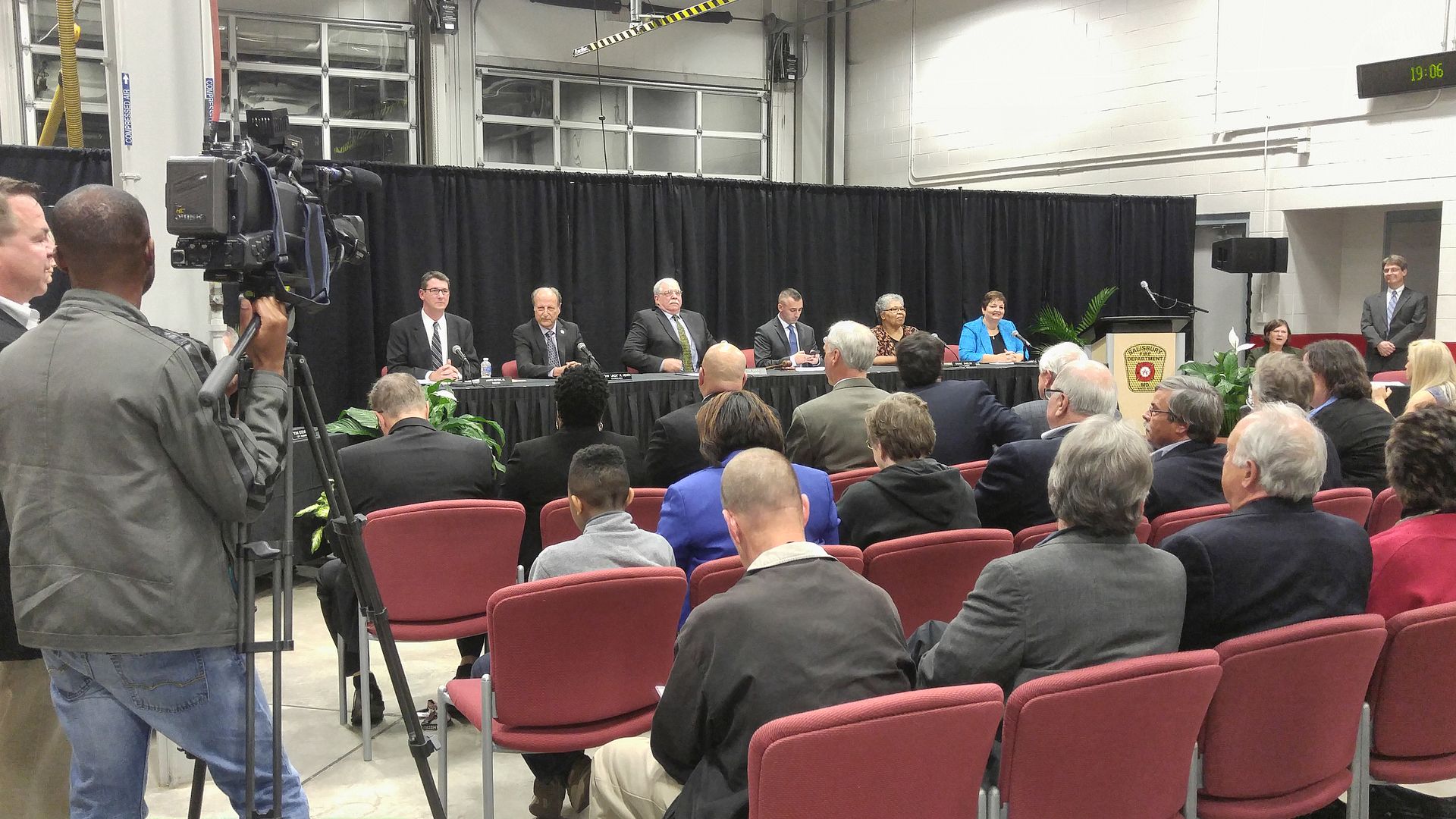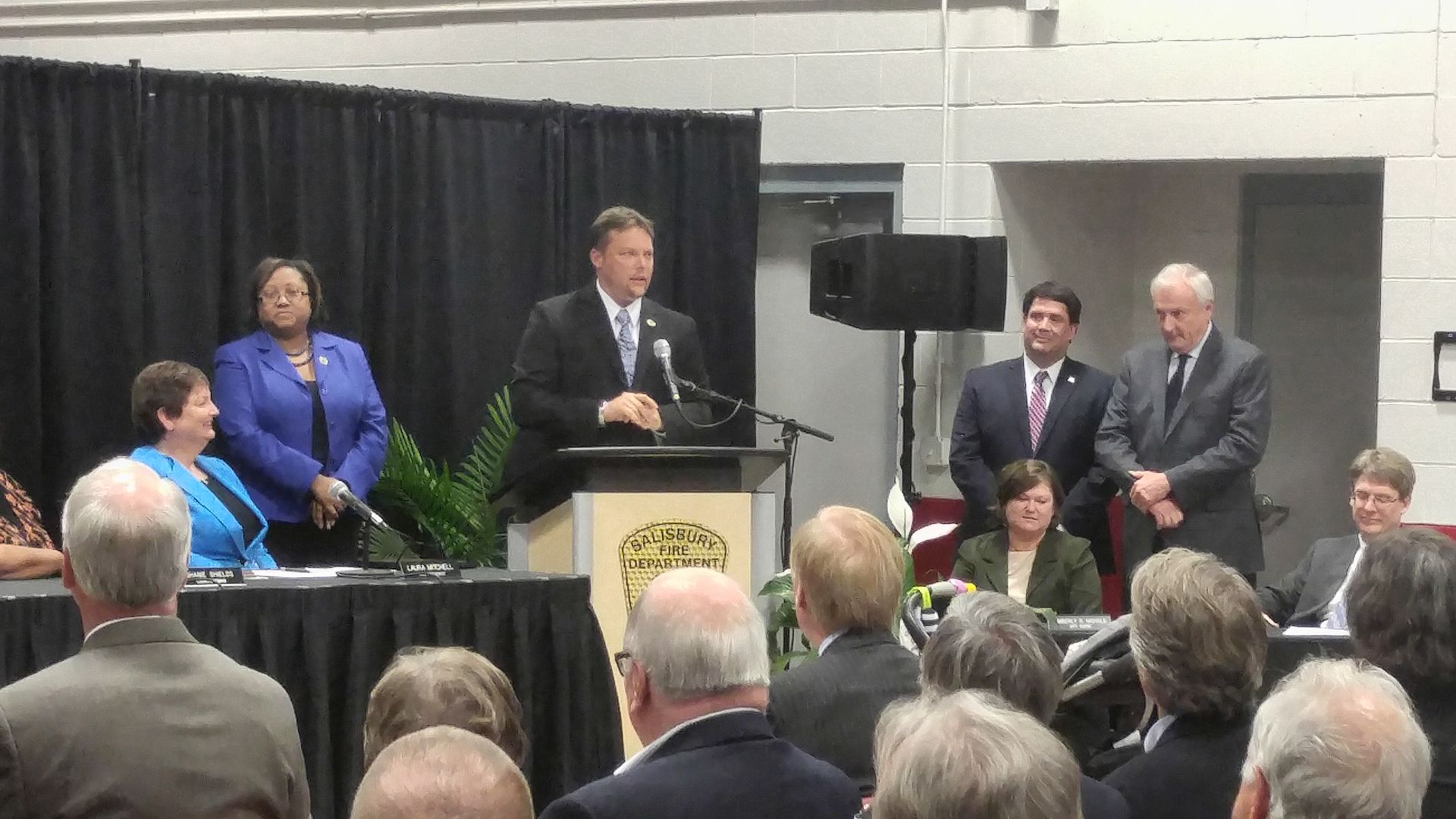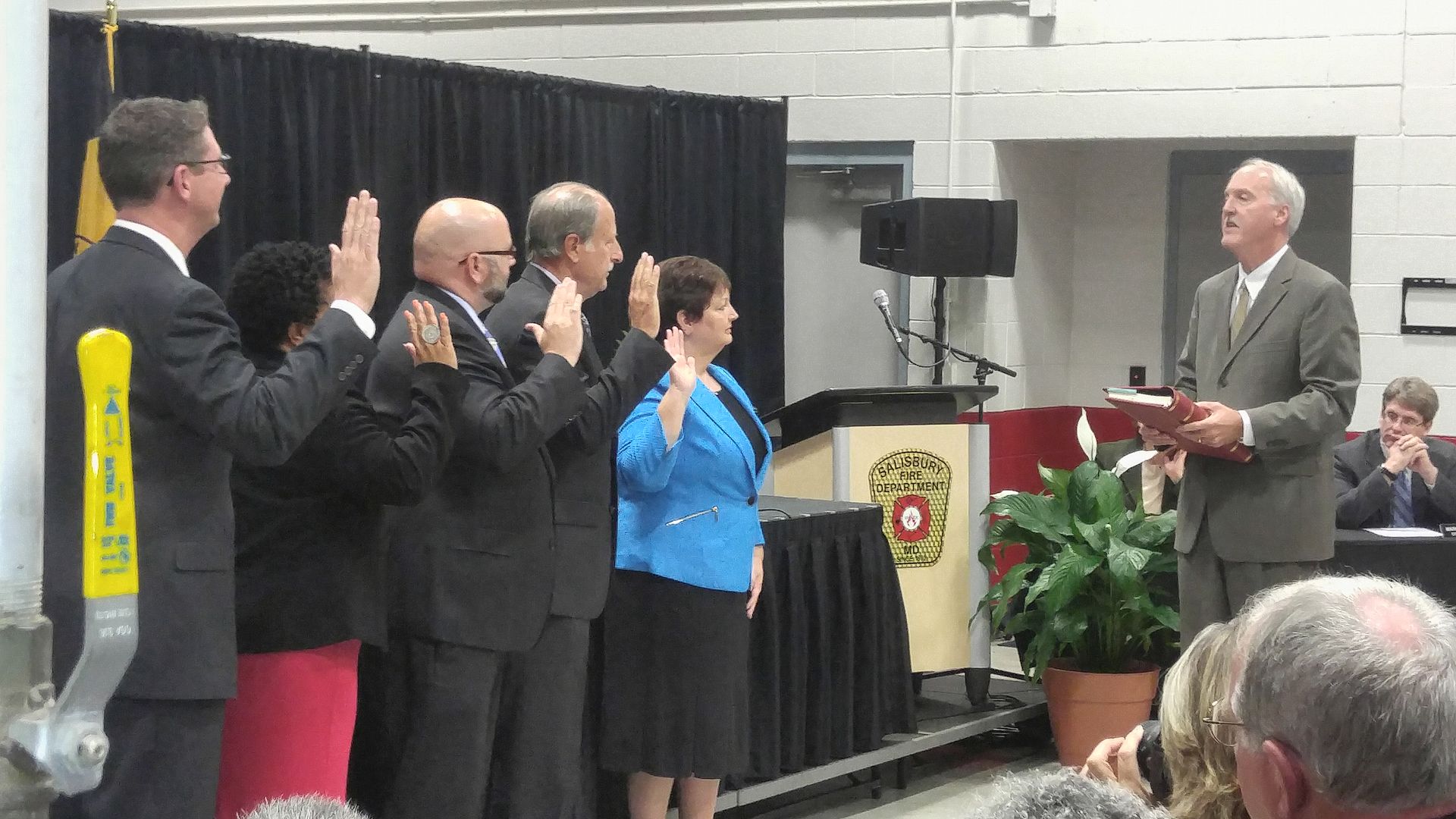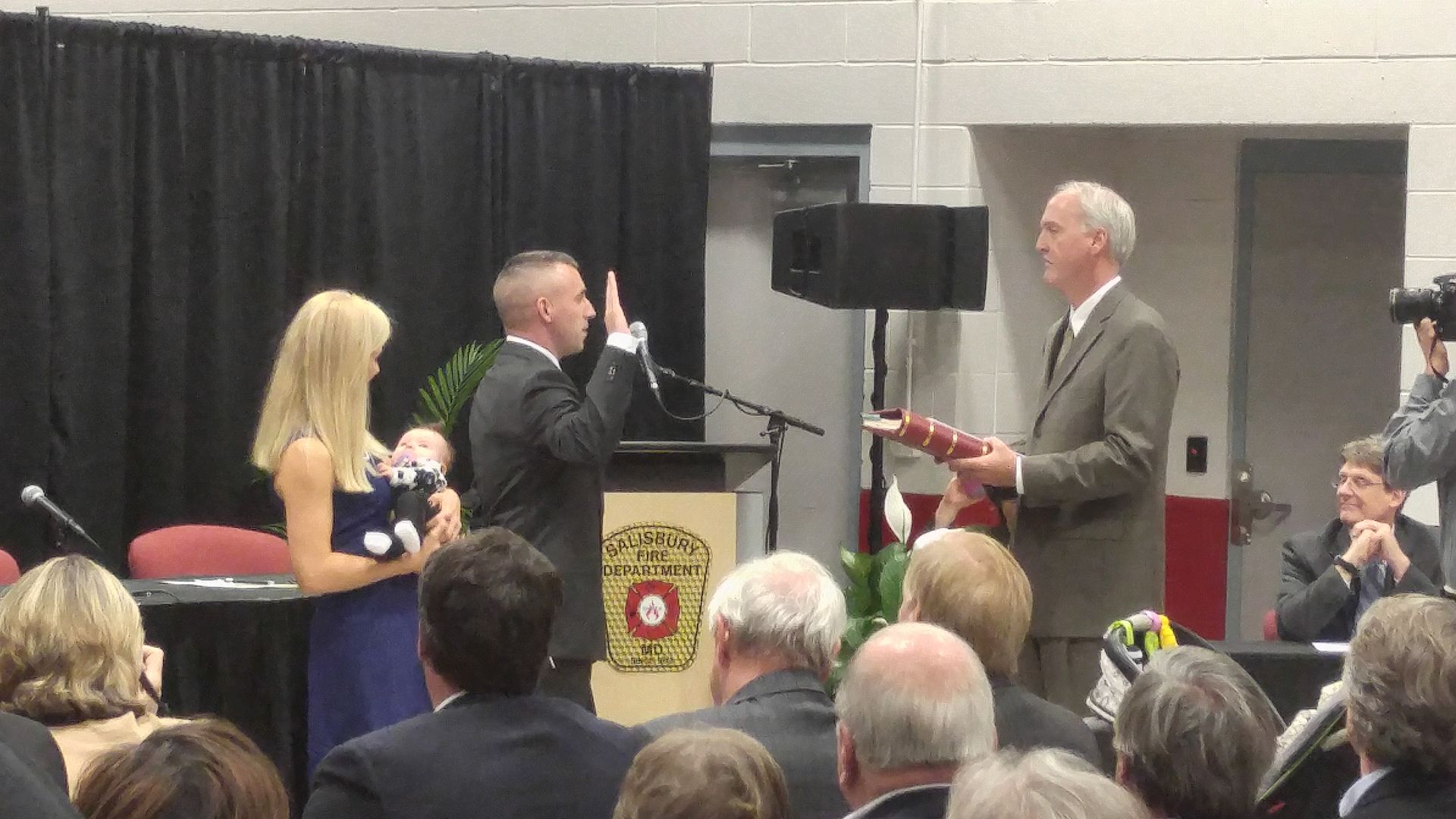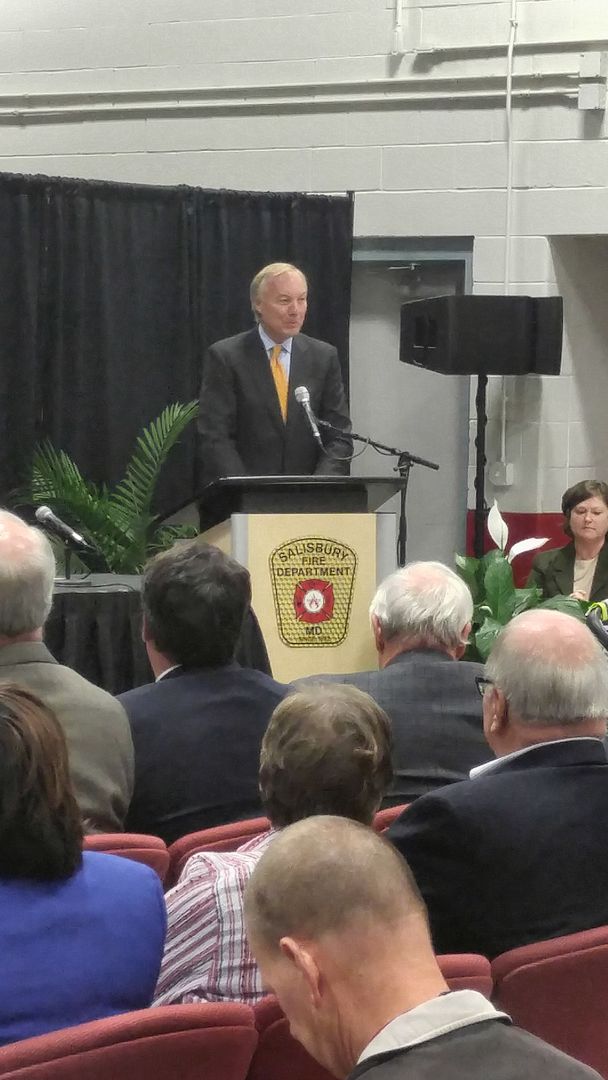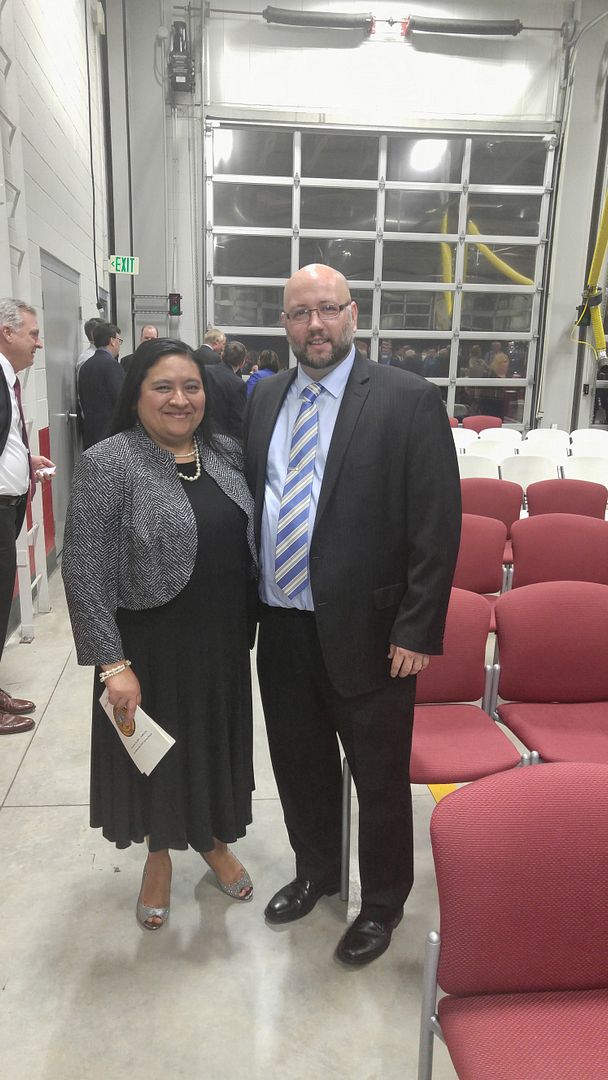Five of six Salisbury City Council hopefuls pleaded their cases before over 100 voters and observers at Perdue Hall on the campus of Salisbury University last evening. Included among the audience were the other three members of City Council not up for election and mayoral candidate Joe Albero. Mayor Jim Ireton was a no-show from the event as was District 1 candidate April Jackson, who was dealing with “health issues.”
Unfortunately, I arrived a little late and missed most of the candidates’ opening statements. But the questions, delivered by moderator Ernie Colburn, mainly dealt with the business aspect of Salisbury – something to be expected when a co-sponsor is the local Chamber of Commerce.
One example was the lidlifter, which asked candidates what their top three priorities for change would be. Shanie Shields would “build partnerships for positive change,” focusing on business, education, and advocating for a STEM program (science, technology, engineering, and math.) Her District 1 opponent, Cynthia Polk, told the audience “my first priority would be jobs.” She wanted to take advantage of local universities and the proximity of Wallops Island as well.
District 2 incumbent Debbie Campbell believed the “things we can do are only limited by our ability to work real hard.” Economic development and public safety were among the items she wished to focus on in a third term, citing her “attention to detail” as an asset. She pointed to the River’s Edge development as a possible way to drive tourism business from Ocean City.
Meanwhile, Jake Day saw it as a matter of restoring prosperity and pride, particularly pride in our government, which he claimed suffered from a “culture of antagonism and pessimism…it has to change.” He wanted to encourage more youth involvement as well.
“My role will be one of a catalyst and culture changer,” said Jack Heath. He then reiterated the familiar themes he’s established throughout his campaign: enhancing the quality of life through jobs, recreation, education, and a safe environment, creating an inviting and vibrant downtown, and having the city government adopt the best ideas regardless of where they came from.
The next question seemed to be tailored as an attack on District 2 incumbent Debbie Campbell, since it asked about the “culture of ‘no'” on the City Council. Heath drew the first response, calling himself “a negotiator…it all starts with culture.” He vowed that, if elected, “I will sign a civility agreement” and ask the others to sign as well. Jake Day agreed, saying we needed open communication and “an entire culture shift.” He promised to establish what he called “coffee talks” and a mayoral/council blog. (It’s worth pointing out that one mayoral candidate and two Council members already have blog sites.)
Debbie Campbell is one of those Council bloggers, but she disagreed with the premise of the question. “This Council has said yes to 70 out of 80 ordinances and 190 out of 200 resolutions,” she countered. If the Daily Times would put news on the news pages and opinion on the opinion pages, we would be better off, she assessed. On the other hand, the renovated Bateman Street/Onley Road intersection was an example where “no” eventually became “yes” once the project was improved, said Campbell.
Shanie Shields disputed Campbell’s account, noting that some of the projects which Council rejected would benefit District 1, like the Bricks project. She wouldn’t sign the Heath civility agreement, since it’s “just a piece of paper,” but wanted to bring back the goal-setting sessions Council used to have.
While Cynthia Polk didn’t have experience with the Council, she pointed back to her time at the former Dresser facility where she organized the employee assistance program. Citing the declining health of her husband of 46 years, she wistfully noted that “once I become a city council person, that’s my family. Family is everything.”
Returning to the economic scene, the question of how to attract higher-paying jobs was next. Debbie Campbell drew the leadoff answer and declared “I think that we leverage what we have…(Salisbury is) uniquely positioned to fill a void” on tech jobs. One other idea worth implementing was using the excess EDUs from the Linens of the Week property, offering them to an entrepreneur who could utilize the property as a job creator.
Shanie Shields, however, believed that property should revert to something along the lines of the neighborhood’s residential nature, like a community center. We need to give kids hands-on experience, Shanie declared, but concluded by asking the question “Are we business-friendly in this town? The answer is no.”
Jake Day used a sports analogy to begin his answer. “We have a great defense, but we need to turn it to a great offense.” He walked through a laundry list of accomplishments from those in his high school class, pointing out one thing in common: they weren’t done here. The kids left Salisbury because opportunities weren’t here, said Day. We need to be more proactive and set ourselves up for success, continued Jake, adding we should remove investment barriers, create a business incubator, and have a full-time economic development officer. Opponent Jack Heath more or less agreed with Day, adding “we need to challenge the university” to come up with additional ideas.
Cynthia Polk recalled the “runaround” she had to endure when opening her business, making the suggestion that it could be done as a piece of software the city could sell.
The next topic got the luxury of longer responses, and crime was the subject. Again Campbell received the lead answer, and she told the audience that while we’ve made progress – in part due to the Safe Streets program – there’s a long way to go. Debbie bemoaned the fact that, for years, the city lost officers to other jurisdictions where they could be paid better, but salary adjustments were made in this budget and the mayor chose not to veto them.
When it comes to increased pay for officers, “I couldn’t agree more,” said Jake Day. But he went further, calling for another 30 police officers. He warned we’ll have to make “hard choices” when it comes to other investments, but didn’t want to ignore technology improvements, either. Those were far down his list of crime-fighting measures, however, as the extra personnel was key.
Jack Heath, however, cautioned there’s another side of the issue – “Thirty cops is extremely expensive.” He quoted a figure of $100,000 per officer (which means the city would need another $3 million each year for 30 more police officers.) Technology could help in high crime areas, he added, but he would defer to the wishes of police Chief Barbara Duncan.
“You can’t lock everyone up,” said Cynthia Polk in her response, which focused more on the root causes. “I don’t know how much that would cost,” she said of after-school programs, but she felt something was needed to respond to a “sense of desperation” on the west side. Polk also came up with a thought about teaching chess in these after-school programs, claiming you could tell the difference between a “chess mind” and a “checkers mind.”
Shanie Shields was more clear: “I do not want to see the city become a police state…most of the people in jail look like me and Cynthia.” (All three District 1 candidates are black.) She called on more preventative programs, but believed they should be funded by Annapolis and Washington, “instead of locking up people.”
The next question dealt with the choice between raising taxes and cutting services. “That’s a loaded question,” Jack Heath replied. He believed revenue could be gained through increasing economic activity.
Jake Day agreed with that principle, although he couched it in terms of increasing property values. To achieve that end, Day called for a downtown-centric approach, wondering aloud how a city could value riverfront surface parking when “we have to create vibrant, livable places.” He repeated an earlier point about removing barriers to investment, and wanted to use budget surpluses to keep a 10% operating reserve. In the meantime, though, “we may need to cut services.”
Debbie Campbell disagreed, though. “This year proved we didn’t have to do either,” she noted. In fact, they funded a few extra items to avoid a tax increase as the budget plan they adopted had items she didn’t care for funding. And after she pointed out that business development pays for itself (as opposed to residential development being a net loss) Campbell concluded “you need a legislator who sharpens her pencil every year.”
Shanie Shields also believed the mayor didn’t have to raise taxes. “Taxes are a bad word,” said Shanie, but she also warned “you can’t cut everything in a budget…I don’t believe in going line by line.” Shainie also bemoaned the fact we have no retail downtown, complaining you have to get in the car and run to Royal Farms or Walgreens to get an aspirin.
So how do we create a business-friendly climate? the body was asked. For Jack Heath the answer was simple: it’s culture. Negotiate the best deals possible, and return to the inclusion process the city had several years ago. Cynthia Polk extended this inclusion idea to one of cultural inclusion, calling for a downtown filled with ethnic eateries.
Debbie Campbell was more direct: “I don’t believe in developer giveaways,” she said. But instead of dealing with excessive bureaucracy, business developers “ought to feel like they just checked into a five-star hotel,” Campbell concluded.
On the other hand, Shanie Shields called herself a “business-friendly person” and told those gathered we need to bring people to the table. We weren’t willing to work with the developers of the abandoned Station 16 project, a building which is downtown sitting empty, said Shanie. She praised the expansion of Salisbury’s enterprise zone to new areas along Snow Hill Road and Eastern Shore Drive.
Once again pounding the themes of being proactive and reducing barriers, Jake Day said we need to become a community willing to invest in itself. But we need no new impact fees, Day said.
The closing statements were quite diverse. Cynthia Polk made it known that she’s not the greatest public speaker, but she had other skills in business ownership and development to make up for it. “I am very versatile,” she said. “I look at people from soul to soul.”
Shanie Shields felt it was her “experience and love for people” that gave her the edge. She spoke about growing up in Salisbury and dealing with family tragedies here, but she had chosen to stay in the town where she was born.
“I stand on my record,” said Debbie Campbell. Noting that legislation required someone who was “detail-oriented,” she cautioned that if a proposal violates state or federal law, “that should be enough to stop you.” It was not her goal to have a “rubber-stamp Council.”
Vowing to bring a “new energy” and “spirit of partnership,” Jake Day seized a little bit on Campbell’s theme, noting that his time in the Army had made him a leader, a planner, and detail-oriented. He would work hard in the position, Day added.
The final word belonged to Jack Heath, who, when asked why he was interrupting his retirement to run, said it was because he loves the city. “Work needs to be done (and) I have the experience,” Heath stated. He promised to make decisions based not on his personal beliefs but what was best for Salisbury.
This is among the final public forums for the six City Council candidates, who will be whittled down to four come next Tuesday. Obviously April Jackson’s health issues come at a most inopportune time as she faces two political veterans, and it may be hard for her to overcome that disadvantage. Yet with such a tiny probable number of votes cast in her district, it’s really difficult to know just how the District 1 race will turn out.
In District 2, however, I suspect Campbell and Day have the advantage going into the final weekend. Jack Heath needs to make a last-minute push for votes to avoid elimination, as I see it.
